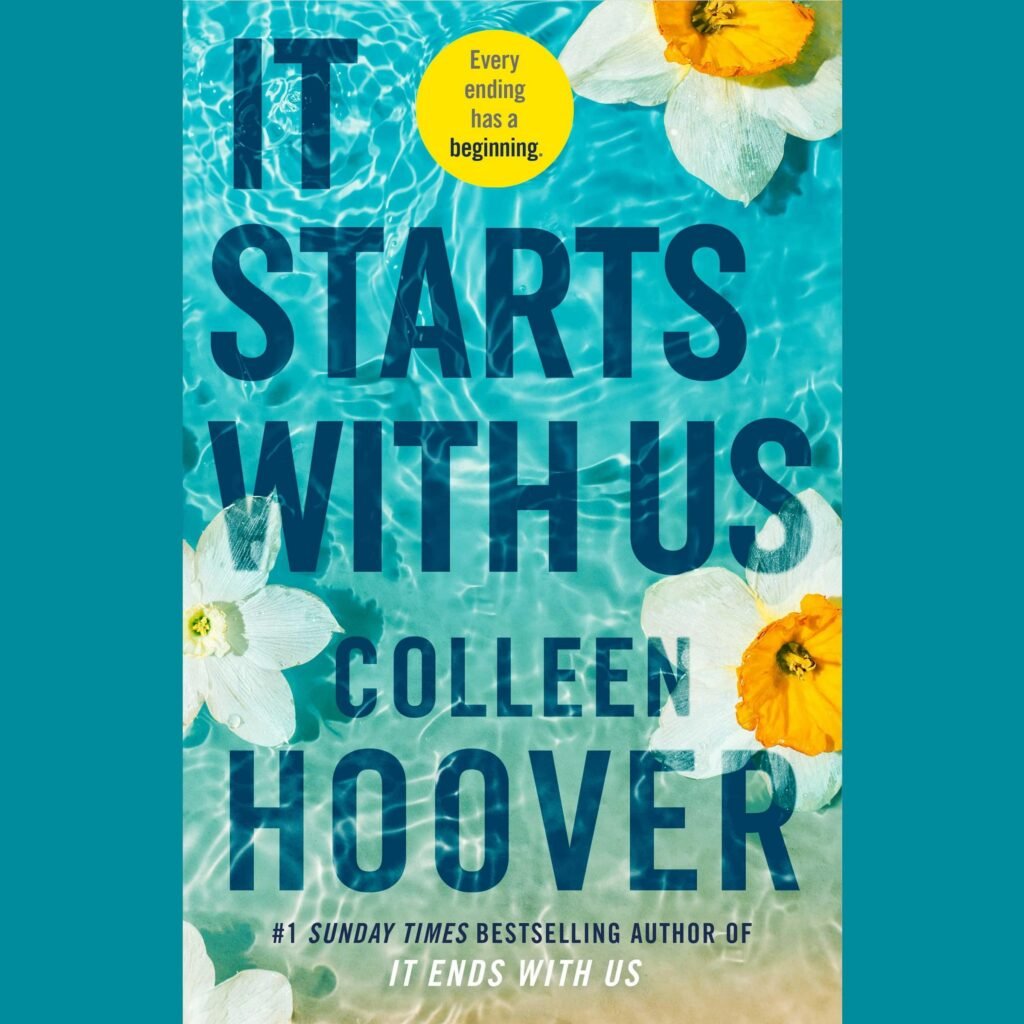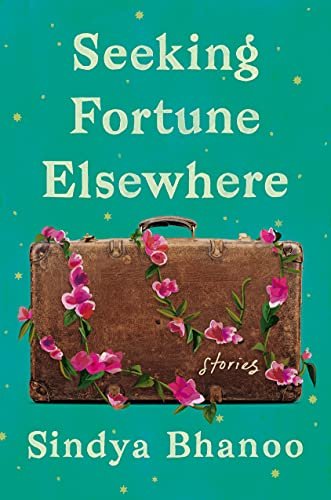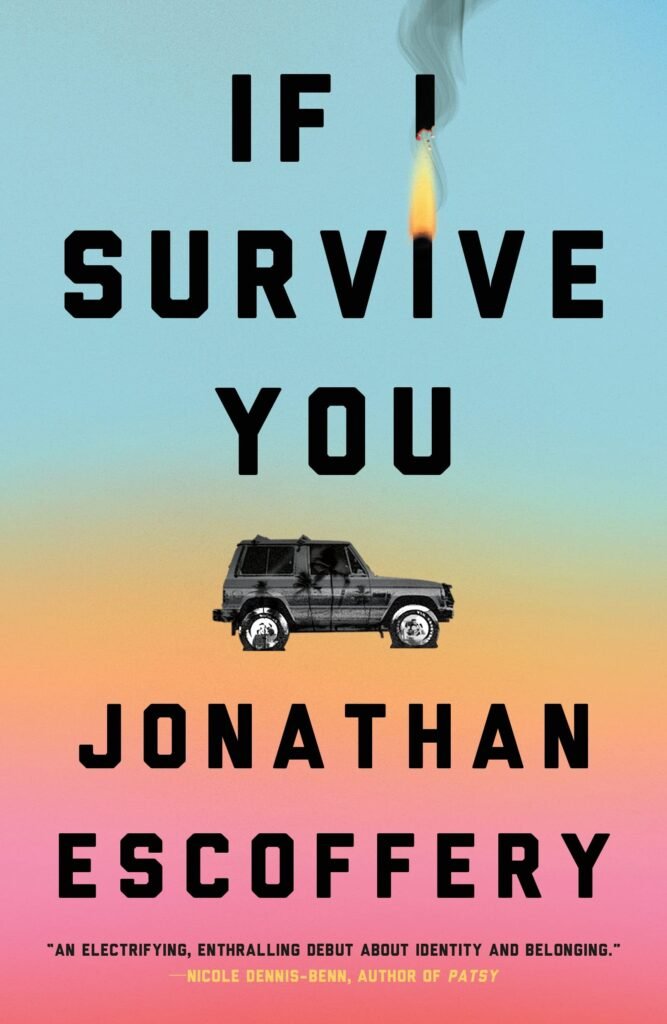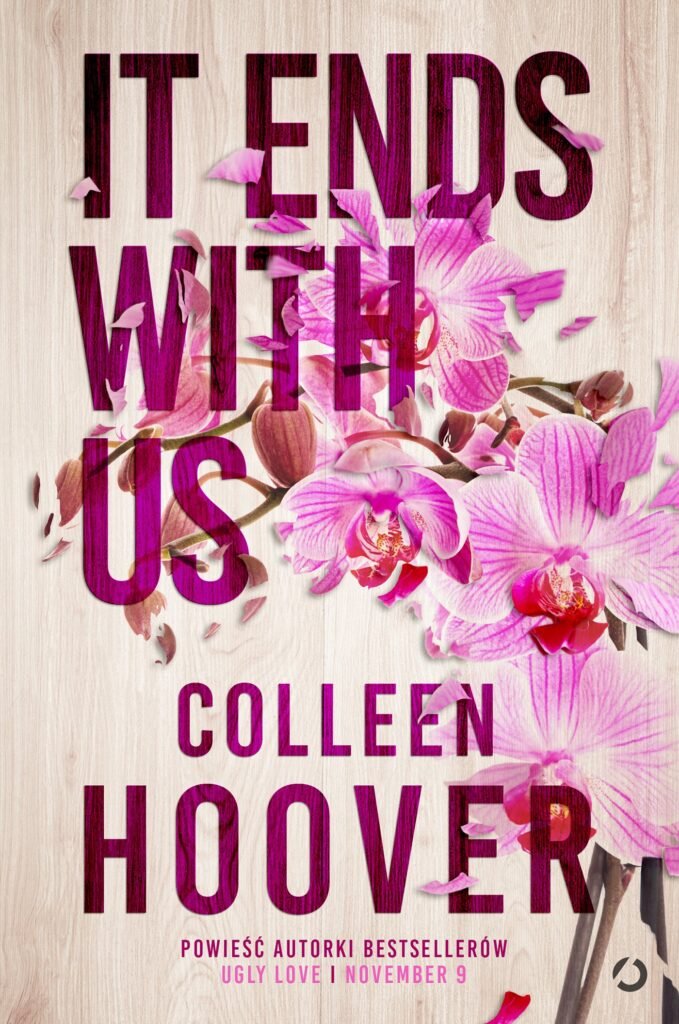“We finally reached the beach, my little whale.”
Collen Hoover
It start with us

For Good Reads, It Ends With Us (2016) depicts domestic violence’s effects as seen through the eyes of a single mother.
Ryle Kincaid, the abusive ex-husband of Lily Bloom, is still a surgeon, and Lily Bloom continues to own a flower business. However, they are currently co-parenting Emerson, a girl who is over a year old. Lily doesn’t want to battle for full custody for fear that it would turn into a costly legal drama or, worse, a violent altercation. She won’t send Emerson to her father’s house overnight until she is old enough to communicate, “So she can tell me if something happens.” Lily thinks that her chance encounter with Atlas Corrigan, a former classmate who also came from an abusive household, will lead to the development of a romantic relationship.
(For new readers, their past is revealed in tender journal entries that Lily writes to Ellen DeGeneres, who plays Finding Nemo, as she reflects on how Atlas was a calming influence during her traumatic upbringing.) Atlas, a single restaurant owner, shares the same sentiments. Lily is divorced, but she isn’t exactly free. Ryle’s bitterness and jealousy can be seen beneath his polite exterior.
To prevent a clash, Lily must carefully consider her dates. Atlas’ mother arrives home in the meantime with devastating news. As Lily struggles with child care, breastfeeding, operating a business, and finding time for herself, Atlas and Lily sneak away for love moments that are sweeter for being so sincere in between. Hoover skillfully depicts the agony and excitement of beginning over through palpable tension balanced with glimmerings of promise.
THE BULLET THAT MISSED

The Thursday Murder Club is back in trouble, this time involving some British television celebrities, a former Russian spy, and an international money launderer, among others.
This is the third book for good reads quotes in Osman’s delightful series of mysteries set at Coopers Chase, a picturesque English retirement community. The first two books have been international best-sellers, and Steven Spielberg has acquired the film rights; if you haven’t read the earlier books, The Thursday Murder Club (2020) and The Man Who Died Twice (2021), it’s a good idea to go back and start at the beginning. The four septuagenarian members of the club—former MI6 agent Elizabeth Best, retired nurse Joyce Meadowcroft, psychiatrist Ibrahim Arif, and longtime union organizer Ron Ritchie—are investigating another cold-case murder in this installment.
Bethany Waites, a local TV journalist, appears to have been about to bust a massive tax evasion scheme when her car crashed off a cliff ten years ago. Who would she meet late at night? Why weren’t more surveillance cameras set up between her house and the cliff? Of course, the friends aren’t satisfied with just doing their research online; they infiltrate a variety of situations that allow them to question Bethany’s friends and colleagues, the chief constable in charge of the case, the drug dealer they imprisoned in the previous volume (who is determined to kill Ron as soon as she gets out), and a slew of other more or less savory characters.
Not to mention the mysterious Viking who has threatened to kill Joyce if Elizabeth does not kill Viktor Illyich, a competitor-turned-friend who was known as the Bullet when he worked for the KGB. All of this allows Osman to stage scenes like “three old men…the gangster, the KGB colonel, and the trades union official” playing snooker, drinking whiskey, and contemplating whether this is all they really need in life. The mysteries are intricate, the characters are vivid, and the whole thing is laced with warm humor and — surprisingly, given the body count — a good feeling. Your next good-read mystery series.
Two Nights in Lisbon

This taut international thriller is filled with secrets, lies, and vengeance.
Ariel Pryce, a newlywed, awakens in a Lisbon hotel room expecting her husband, John Wright, to be in bed beside her. He’s not. She looks for a note, calls him, and inquires with hotel staff, all to no avail. She contacts the Portuguese police and then the American Embassy, which initially wonders if Ms. Pryce isn’t some insane woman wasting everyone’s time. However, a lot happens very quickly: Ariel receives a ransom demand for 3 million euros to be delivered within 48 hours in exchange for John’s safe release from unknown captors. The CIA suspects John is not who he claims to be and believes Ariel “must be more important than she’s letting on.” For one thing, as an adult, she changed her name from Laurel Turner.
A nosy American reporter begins to poke around. Pavone uses short scenes to build fast-paced tension by shifting between past and present and between the perspectives of Ariel and her various observers. Whom to blame for the kidnapping and why? Ariel isn’t wealthy, and the only way to raise funds is through blackmail. She and her extorter are capable of causing significant harm to each other, and one of them had a head start years ago.
So, will she get the money and save John? Then suspicious cops prevent Ariel from boarding a flight to the United States,The CIA is listening in on her phone calls, at least one CIA observer wonders how much it would cost to have her whacked, and a relentless, coke-sniffing reporter is convinced he smells a blockbuster scoop. Surprise follows surprise, and despite the reader’s ability to predict where the complicated plot is going, the twists keep coming. Two nights in Lisbon sound like a fun vacation, as long as no one is trying to dig up a terrible secret from your past. This high-stakes drama captures and holds your attention for good reads.
Killers of a Certain age.

A surprising assassination attempt—on them—brings four female assassins on the verge of retirement back into the game.
Billie, Mary Alice, Helen, and Natalie have been working as secret assassins for a clandestine international organisation founded to hunt Nazis since their twenties. They’re now in their mid-60s, and the Museum, or the Museum’s elite group, has sent them on an all-expenses-paid cruise to celebrate their retirement. However, Billie discovers another of the Museum’s assassins onboard the ship several hours into the journey.
It turns out that she and her colleagues found a plot to kill themselves. They are forced to flee while also attempting to solve the mystery of why their employers have placed targets on their backs. The plot shifts back and forth between the late 1970s and early 1980s, when the women were first recruited, and the present day, when the female assassins have all lived long, full lives and are more concerned with menopause and lost spouses than who they will kill next.
When the two timelines are juxtaposed, an intriguing dichotomy emerges that examines the nuances of the female aging process from a novel perspective. Billie is a complex and likable character, but the other three women, while easy to root for, blend together. Raybourn vividly evokes a number of far-flung locations as the women race around the world trying to stay alive, keeping readers guessing what will happen next. A compelling, complex mystery as well as a one-of-a-kind evaluation of womanhood.
Seeking Fortune Elsewhere

Eight stories are good reads about cultural and geographic dislocation, as well as family life and romantic dislocation.
An elderly woman, parked in a “retirement-community-cum-old-age-home” in Coimbatore, India, by her well-meaning daughter who lives in the United States, tells a lie that restores some of her agency while also emphasizing how empty her life has become. A mother realizes she hasn’t been invited to her daughter’s buddy moon, a recent trend in which newlywed couples go on honeymoons with friends and family, but her ex-girlfriend’s husband has.
A professor is accused of taking advantage of his graduate students, all of whom are Indian immigrants like him, by asking them to do housework. Throughout this stunning debut collection of stories, Bhanoo, a longtime newspaper reporter, focuses on devastating moments of loss—the results of aging, cultural misunderstanding, so-called progress, fickle hearts, and even tragedy. The professor, who sees himself in his graduate students, who are thousands of miles away from India and finishing their studies in small college towns like Bozeman, Montana, can’t accept his sense of himself as treating them “like family, because their own families were so far away” with the charge that he took advantage of them.
Veena returns obsessively to the nature center where children can trade found objects like sand dollars and dead insects for points that can be forgiven for rewards in “Nature Exchange,” a heartbreaking story about a woman whose son was killed in a school shooting. Her little boy was saving up for a pair of antlers before his father died. As she struggles to move on with her life, Veena becomes fixated on the antlers, as if they will liberate her from her grief. These are psychologically astute stories that are also compelling. Bhanoo turns human drama into a mystery by withholding key details. Graceful stories by a writer who understands even the most flawed and despondent among us.
If I Survive You

A series of interconnected stories about one family’s stormy journeys in Jamaica and Florida.
Trelawny, the bookish son of Jamaican parents whose place in the world is complicated both physically (he’s homeless for a time) and ethnically, is the focus of Escoffery’s sharp and inventive debut. His light-skinned, mixed-race parents in Jamaica believe they are superior to those with darker skin; growing up in Miami, he is mistaken for Dominican; and in college in the Midwest, he becomes “unquestionably Black.”
In the opening of good reads story, “In Flux,” Trelawny’s efforts to find his identity frustrate both him and others; he’s at the center of a question he can’t answer and few others want to face. That uncertainty follows him throughout the novel as he competes for his father’s and older brother’s approval. (Delano’s thoughts capture the futility of the situation: “You try to make it better, only to make it worse. It is preferable to do nothing.”) But, while Escoffery’s characters are conflicted, his writing is astute, commanding, and adaptable—at his home in first and second person, standard English and Jamaican patois, Miami ethnic enclaves and white-bread high rises.
And he writes thoughtfully about how the external forces that have thrown Trelawny’s family off balance—Hurricane Andrew, poverty, racism—interact with and stoke Trelawny’s interior fears and bouts of self-loathing. A strong debut that examines the complexities of cultural identity with wit, savvy, and a strong sense of place.
It Ends with us

The most recent good reads reviews book by Hoover (November 9, 2015, etc.) approaches the difficult subject of spousal abuse with romantic sensitivity and emotional weight.
The couple appears to be cool but cute at first glance: Ryle Kincaid is a surgeon who claims he never wants to get married or have children, while Lily Bloom owns a flower shop for those who detest flowers. On the same night that Ryle loses a patient and Lily attends the funeral of her violent father, they cross paths on a rooftop in Boston. When Ryle’s sister, who later becomes Lily’s employee and close friend, warns Lily about his plans, the enticing opening takes a sinister turn. Lily vows she’ll never again live in an abusive household, but when Ryle begins to exhibit all the same red flags her mother overlooked, Lily realizes how difficult it is to say goodbye. Lily can defend Ryle’s actions when he is not engulfed in a jealous rage by telling herself, “I think we needed what occurred on the stairwell to happen so that I would know his past and we’d be able to work on it together.” Lily marries Ryle in the hopes that the positive would outweigh the negative, and when Lily looks back on her upbringing with new eyes, the mother-daughter interactions develop beautifully. Flashbacks to Lily’s adolescent years, when she met her first love, Atlas Corrigan, a homeless kid she found squatting in a neighbor’s house, are provided by diaries fancifully sent to TV personality Ellen DeGeneres. Atlas, who is now a successful chef, appears in Boston and urges Lily to leave Ryle. An unforeseen difficulty pushes Lily to break up her relationship with Atlas, confront Ryle, and attempt to stop the cycle of abuse before it’s too late—despite the better option being right in front of her. The author’s note at the conclusion that describes Hoover’s personal connection to the subject matter is a must-read. The relationships are shown with compassion and honesty.
“We don’t focus too much on what isn’t working out in our lives. We focus on what is, and there’s a lot to be grateful for.”
Colleen Hover

[…] The Best books for Good reads […]
[…] The Best books for Good reads […]
[…] The Best books for Good reads […]
Thank you very much for sharing, I learned a lot from your article. Very cool. Thanks.